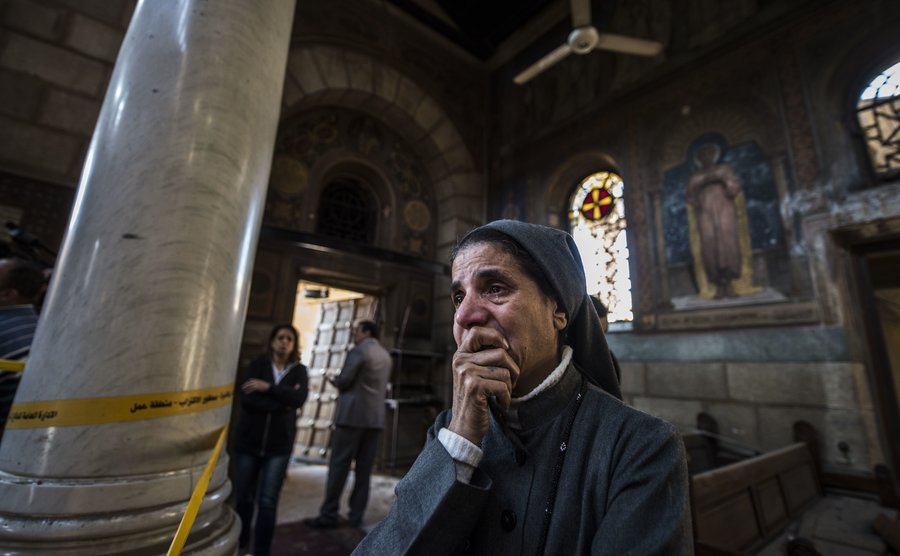Anger continues to grow over what is seen as inaction on the part of the Egyptian government after a bombing yesterday morning at the Coptic cathedral in Cairo. As of Monday morning, no group had claimed responsibility for the attack, although members of Daesh (also known as ISIS) celebrated it on social media. Previously, it had been thought that a militant Islamic group, the Hasam Movement, might be the perpetrators, as they have claimed responsibility for a number of attacks on Egyptian security forces. They denied it in a statement on their Facebook page, however, saying, “Our prophet had taught us even while we fight not to kill a child nor woman nor old person nor worshiper in his place of worship.” Yesterday’s bombing occurred during a celebration of the Prophet Muhammad’s birth and the blast was focused in the women’s section of St. Peter’s church. At least 25 people were killed, mostly women and children, and over 49 more injured. The Egyptian health ministry expects more victims to succumb to their wounds. St. Peter’s is an ancillary church in the cathedral; worshipers were gathered there due to renovations in the main church. Witnesses reported it being packed because of the holiday. “I found bodies, many of them women, lying on the pews. It was a horrible scene,” cathedral worker Attiya Mahrous.
This is the second major attack to have occurred in Cairo in three days, after an explosion at a security checkpoint killed six police officers on Friday. A small Islamist militant group, the Revolution Brigade, claimed responsibility for that act. Egypt has been struggling with skyrocketing inflation and the near-collapse of their economy, with shortages of staple foods plaguing the population. Tension has been growing over recent months as hardships increase. Although threatened protests have not materialized, some believe that the recent attacks are an attempt to incite a response to the economic situation through violence. President Abdel Fattah el-Sisi, elected in 2014 in the aftermath of Egypt’s revolution, has cracked down on protests and imprisoned thousands of opposition leaders in the name of security. However, many feel that he has not lived up to his campaign promises, and unrest has been growing after months of comparative peace. “Perhaps, more than anything, today’s attack demonstrates the extent to which Sisi, who came to power largely on a security platform, has failed to deliver on one of his most important campaign promises,” said Mohammad Elmasry, of the Doha Institute for Graduate Studies in an interview with Al Jazeera. Attacks against Copts in the city of Minya especially have been escalating, supposedly because of the building of churches without permits, and police have been slow to respond to the violence and subdue the mobs.
Pope Tawadros II, the head of the Coptic Church, has been vocal in his support of President Sisi, after the president made explicit promises to protect the Christian denomination. However, this has made the Copts targets for Islamic extremists. Sisi was elected after a military coup ousted Mohamed Morsi, leader of the Muslim Brotherhood party, which is now outlawed. Although President Sisi relies on strong support from the Muslim majority, his ruthless crackdown on the Muslim Brotherhood has caused retaliatory attacks, especially against the Copts, who make up about 10% of Egypt’s population. This wave of violence is not particularly new, as Coptic Christians have been discriminated against for decades. They are the largest denomination of Christians in Egypt, but they have little to no representation in the government, and face job and housing discrimination for their religion.
Although President Sisi declared a three-day national mourning period following the attack on the church, the crowd gathered there yesterday afternoon was angry and tense, chanting anti-government slogans, including “the people demand the downfall of the regime,” a trademark of the 2011 uprisings that led to the collapse of President Hosni Mubarak’s 30 year rule. Both Christians and Muslims joined in the protests at the cathedral yesterday, calling out that this was not “sectarian strife.” Many worshipers feel that government provided security at the church has been lax, allowing the bomb to be planted. Security officials have claimed that the bomb was “lobbed” into the building, and more recently that it was smuggled in in a handbag, despite metal detectors at the doors and supposed bag searches.
Worshipers at the church remembered the 2011 bombing in Alexandria at the Two Saints Church, which left 23 dead. No responsibility has been claimed, and in the ensuing six years, no progress has been made in finding who was behind the attack. Some suspect that former President Mubarak instigated the attack as a misdirect from the growing unrest against him. Members of the church feel dubious that the government will pursue justice in Sunday’s attack any more aggressively than they have that of 2011. However, the Coptic Church issued a statement on its Facebook page, calling for unity. “As we are bereaved by this violence and terrorism that attacks worshipers, we pray for these martyrs and for the wounded. The Egyptian church stresses on persevering national unity that keeps all Egyptians on Egypt’s blessed land.”
An unnamed woman left yesterday’s scene heartbroken; “They are all dead,” she said, “They were all my friends.”

